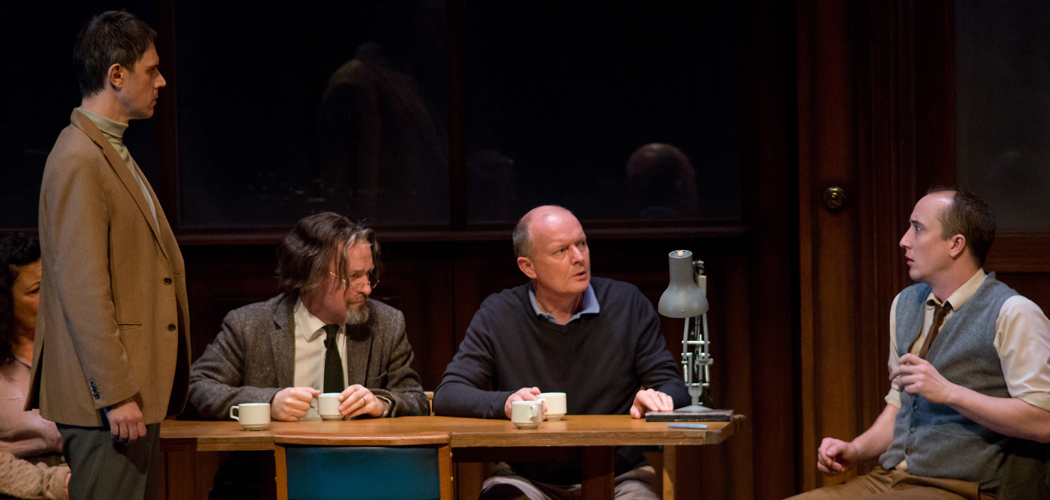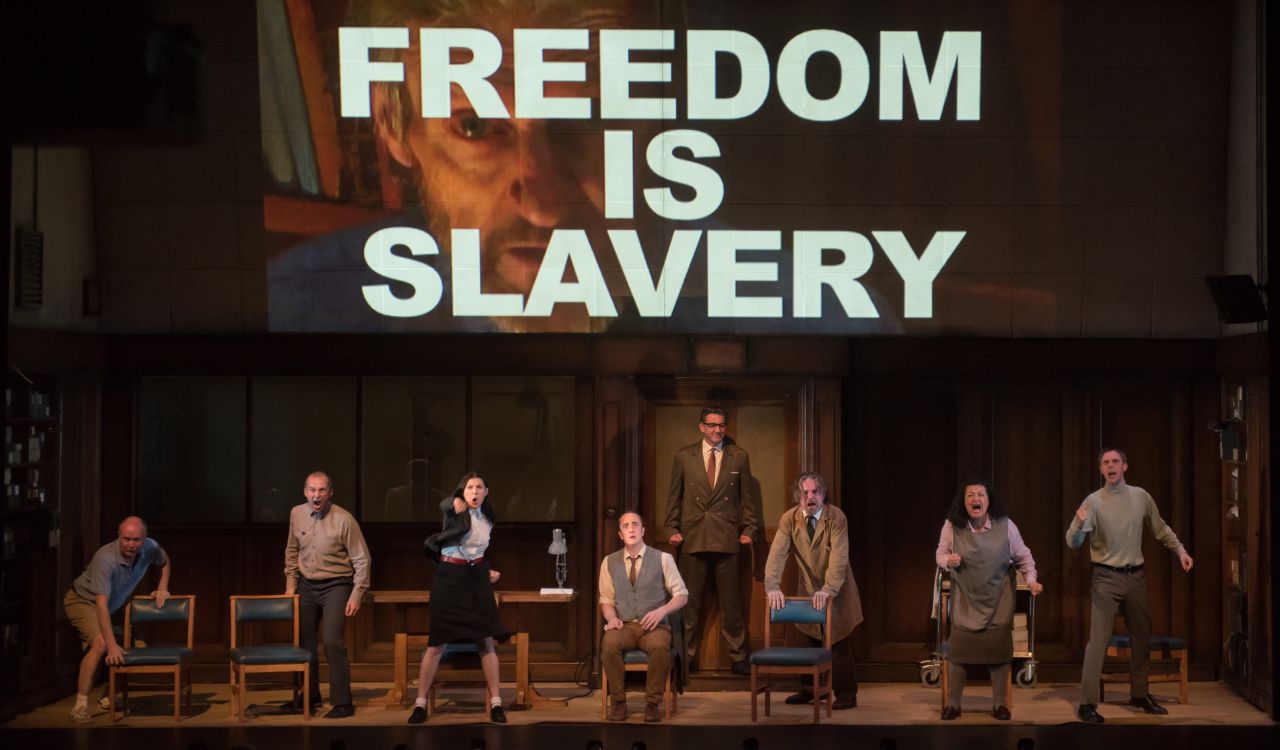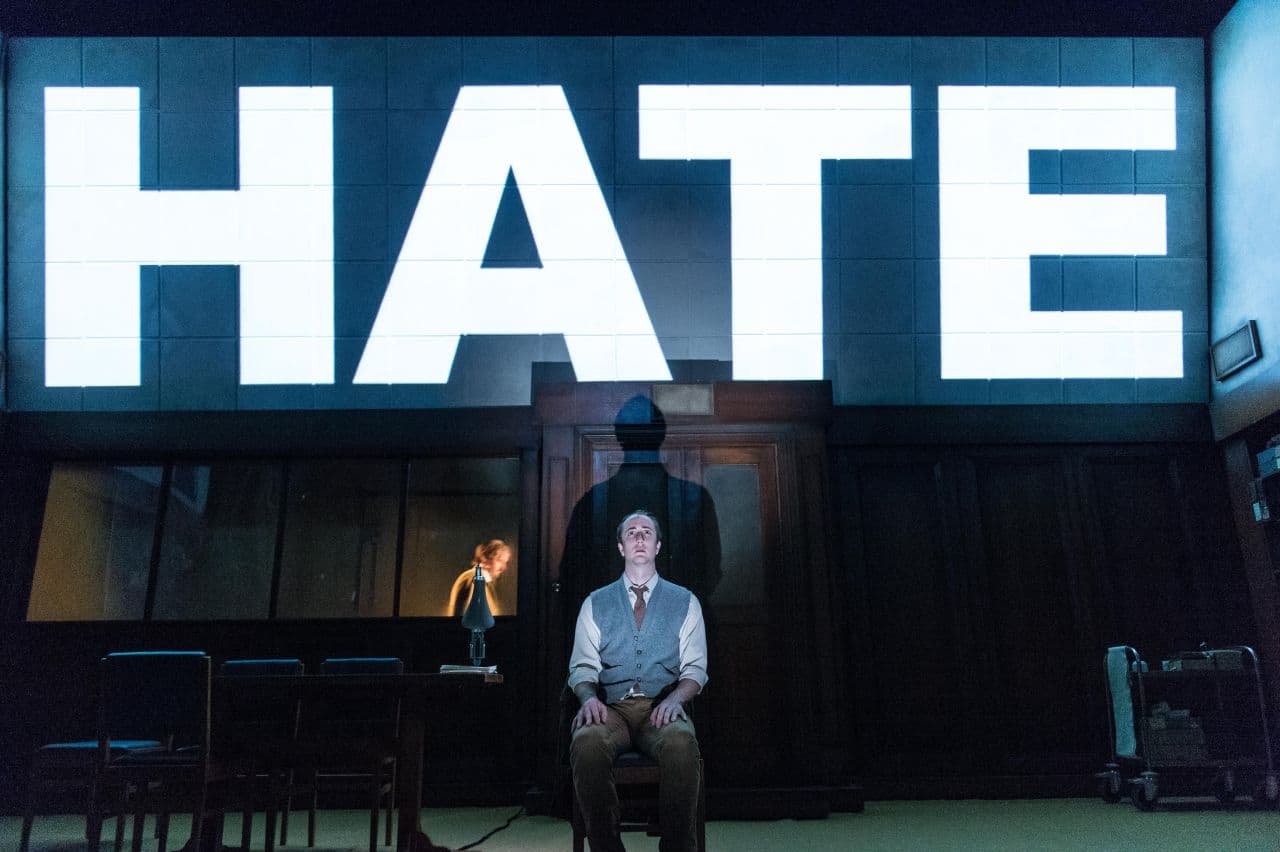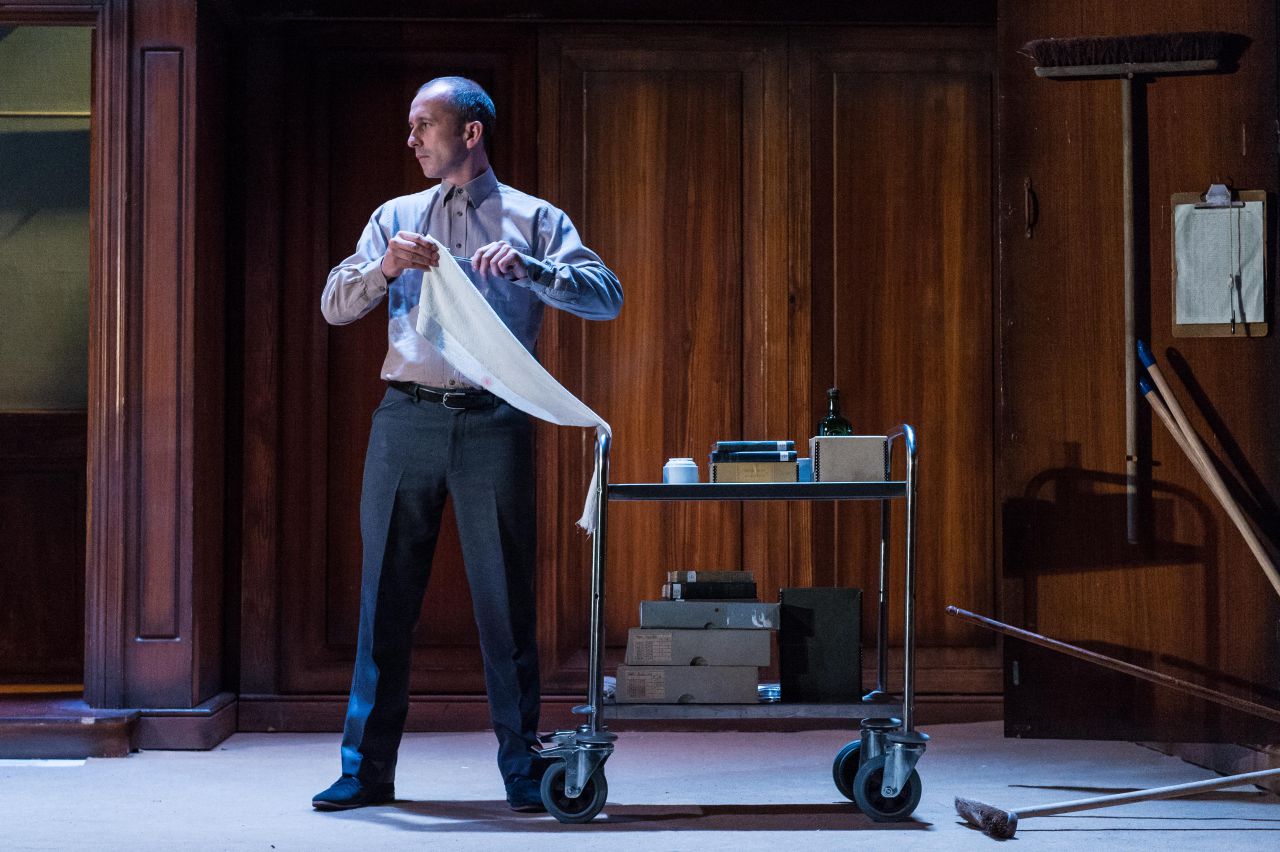Advertisement
Same Fears, Different Century: Stage Adaptation Of Orwell’s '1984' Still Ominously Relevant
Resume
It seems Big Brother never gets old — and he's still watching us. That's according to a new stage adaptation of George Orwell’s dystopian novel "1984" that just opened at the American Repertory Theater in Cambridge. The British production was a sold-out, smash hit in London. Now it's touring the U.S., which gives us an excuse to explore how and why Orwell's tale — which was published in 1949 — still feels ominously relevant and totally creepy in 2016.
Fears That Endure
Big data. Body cams. Cyber security. NSA whistle blower Edward Snowden. WikiLeaks founder Julian Assange. The list goes on.
It’s not hard to see why the young, rising British director Robert Icke was compelled to make a suggestion to his writing and directing partner Duncan Macmillan back in 2013. They were looking to adapt a novel for the stage and Icke thought it was time to take another look at "1984."
"Sort of the surveillance question was very much in the air — and of course that’s the off-the-shelf obvious things we always feel that the novel is about," Icke said. "In fact it’s about much more than that, and it’s much more deep and searching and subtle than purely about whether or not you should have cameras everywhere."
Icke, who's now the associate director at the Almeida Theatre in London, said "1984" touched a nerve from the moment it was published. And its frightening relevance has endured, the director added, through the post-World War II period in his country, the Cold War and the Red Scare in the U.S.
"At every period of history a different bit of it has come into focus, which I suppose in some ways is characteristic of great art," Icke mused, "but, I think — particularly now — it's our fears about being recorded, about the way we sign away our privacy, about what liberty means, but also about the distrust of the systems which govern."

On stage Icke and Macmillan's version of "1984" has a Stanley Kubrick or David Lynch style. Lights flicker. Suspicious-looking characters enter and exit. Time and place shift abruptly. In their re-imagining, the creators took cues from the novels oft-overlooked appendix, but Orwell's basic plot remains the same.
Protagonist Winston Smith — or Comrade 6079 — lives in a bleak world where an Inner Party controls everything. He works as an editor (of sorts) deleting information and even people from the public record.
The populace is directed to live by three pervasive mantras:
War is Peace,
Freedom is Slavery,
Ignorance is Strength.
Independent thinking is called “thought crime” and Big Brother is always watching from the ubiquitous telescreens.
Actor Matthew Spencer plays Winston who, early in the play, starts to rebel. While hiding from the telescreen in his apartment Winston does something he knows is punishable by death.
"I’m writing a diary. An account — evidence — that in all this insanity one person held tight to the truth. I can see what the future will look, a future free of the party, people free to talk and think. All this will change, it has to change. I thought I was writing for the future, for the unborn. But now I think I’m writing for you."

Before auditioning for this role Spencer admitted he was convinced that — like many people — he had read "1984" in school. Probably because the themes and ideas in the novel are so deeply ingrained in our popular culture and imagination. "But I actually hadn’t [read it]. So I was surprised by how relevant and ‘of now’ that it felt," Spencer said.
The Age Of Self-Surveillance
The play has made the actor reflect on the ways we voluntarily give up our personal information these days.
"So much of surveillance is a kind of 'self-surveillance' — selfies of where you are or whatever," Spencer told me. "I’ve definitely become more aware of monitoring that a little bit," he added, laughing.
Then there are those incessant location request messages Spencer — and a lot of us — get on our iPhones. "No one’s forcing you to give that!" he marveled. "You know, you can choose to have it on and off — and most people just say, ‘Yeah, I’m fine with that.' "
To that common response to the location request, Harvard Law School professor Jonathan Zittrain says, "Well and that choice, I think, is too often fairly illusory."
Zittrain founded the Berkman Center for Internet and Society.
"It has the quality of somebody telling their child, 'When you go to bed at 8 p.m. tonight, do you want to wear your yellow pajamas or your blue pajamas?' " the law professor continued. "It’s a fake choice in that you’re still going to bed at the time I say."
Zittrain is steeped in Internet privacy and surveillance issues, which probably explains why he happily agreed to see the touring production of "1984" at the A.R.T. — on Valentine’s Day no less.
After the show he had a ton of ideas to share. For one, Zittrain said we 21st century citizens should heed the 20th century text's dark warnings of totalitarianism and thought control.
"That may seem quite removed from our technology-enabled freedoms of today — to say what we want, to read what we want, to click where we want to go," he said. "That freedom shouldn’t make us complacent about the ways in which our perceptions still are shaped, quite subtly, by what a search engine chooses to offer up when we search for something."

But Zittrain also reminds us how different things were back when Orwell created this novel in 1948.
"The kind of effort you would need to place lots of people under 24-hour surveillance could only be in the hands of a totalitarian state. And today it’s quite trivial," he said, clarifying, "which means there can be multiple states engaging in that kind of surveillance, there can be companies engaging in that kind of surveillance, there can be TMZ engaging in that kind of surveillance."
On top of surveillance issues, Zittrain said seeing a new take on this classic caused him to ponder other ethical puzzles in "1984" — including the creation and revision of history that Winston does for his job at the Ministry of Truth — which people do all the time on the Internet.
The law professor added that Orwell’s rich story is also a potent reminder that anyone can become prisoner to a system — and that we should all ask: "What is the truth?" and "What is humanity?"
If audiences do that, then the team behind this re-examination of "1984" will have done what they set out to do.
The American Repertory Theater presents "1984" through March 6.
